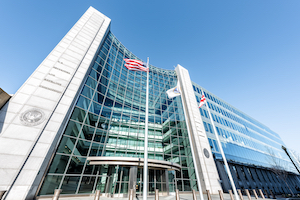The Securities and Exchange Commission on July 25 proposed new rules to address what it describes as risks to investors from conflicts of interest associated with the use of predictive data analytics by broker-dealers (BDs) and investment advisers (IAs).
 The Commission voted 3-2, along party lines, with the two Republican commissioners (Hester Peirce and Mark Uyeda) criticizing the proposal as being overly broad and potentially stifling innovation.
The Commission voted 3-2, along party lines, with the two Republican commissioners (Hester Peirce and Mark Uyeda) criticizing the proposal as being overly broad and potentially stifling innovation.
Under the proposal, BDs and IAs would be required to take certain steps to address potential conflicts of interest associated with their use of predictive data analytics and similar technologies to interact with investors to prevent firms from placing their interests ahead of investors’ interests.
“Today’s predictive data analytics models provide an increasing ability to make predictions about each of us as individuals, SEC Chair Gary Gensler said in a statement. “This raises possibilities that conflicts may arise to the extent that advisers or brokers are optimizing to place their interests ahead of their investors’ interests. I believe that, if adopted, these rules would help protect investors from conflicts of interest—and require that, regardless of the technology used, firms meet their obligations not to place their own interests ahead of investors’ interests,” he added.
According to the SEC, the use by BDs and IAs of AI technologies has accelerated, which it notes can be beneficial to investors. However, to the extent that firms are using certain technologies in a manner that places their own interests ahead of investors’ interests, investors can suffer financial harm.
“Given the scalability of these technologies and the potential for firms to reach a broad audience at a rapid speed, any resulting conflicts of interest could cause harm to investors in a more pronounced fashion and on a broader scale than previously possible,” the SEC notes in the proposal’s release.
Proposed Requirements
Building off existing legal standards, the proposed rules generally would require a firm to evaluate and determine whether its use of certain technologies in investor interactions involves a conflict of interest that results in the firm’s interests being placed ahead of investors’ interests.
More specifically, the proposal would require:
- a firm to eliminate or neutralize the effect of conflicts of interest associated with the firm’s use of covered technologies in investor interactions that place the firm’s or its associated person’s interest ahead of investors’ interests;
- a firm that has any investor interaction using covered technology to have written policies and procedures designed to prevent violations of (in the case of IAs) or achieve compliance with (in the case of BDs) the proposed rules; and
- the maintenance of recordkeeping related to the proposed conflicts rules.
Firms would be permitted to employ tools that they believe would address these risks and that are specific to the particular technology they use, consistent with the proposal, the SEC further notes.
The proposal generally would apply to a firm’s use of a covered technology to the extent it is used in connection with engagement or communication with an investor, including by exercising discretion with respect to an investor’s account, providing information to an investor, or soliciting an investor.
“Covered technology” would include a firm’s use of analytical, technological, or computational functions, algorithms, models, correlation matrices, or similar methods or processes that optimize for, predict, guide, forecast, or direct investment-related behaviors or outcomes of an investor, an SEC Fact Sheet explains.
A public comment period will remain open until 60 days after publication of the proposal in the Federal Register.
Additional Tech Guidance
Meanwhile, July 26 was a busy day for the SEC, with the agency finalizing a cybersecurity disclosure rule and proposing a new exemption relating to investment advisers operating exclusively through the internet.
Proposed exemption for certain investment advisers operating through the internet. The Commission proposed to exempt certain investment advisers who provide advisory services through the internet from the prohibition on Commission registration, as well as related amendments to Form ADV. The SEC notes that the proposed amendments are designed to modernize the rule’s conditions to account for the evolution in technology and the investment advisory industry since the adoption of the rule. Comments should be received by 60 days after publication in the Federal Register.
Final rules requiring disclosure of material cybersecurity incidents and disclosure of cybersecurity risk management in annual reports. The SEC also adopted rules requiring registrants to disclose material cybersecurity incidents they experience and to disclose material information regarding their cybersecurity risk management, strategy and governance annually. The Commission also adopted rules requiring foreign private issuers to make comparable disclosures.
The final rules will become effective 30 days following publication in the Federal Register. The Form 10-K and Form 20-F disclosures will be due beginning with annual reports for fiscal years ending on or after Dec. 15, 2023. The Form 8-K and Form 6-K disclosures will be due beginning the later of 90 days after publication in the Federal Register or Dec. 18, 2023. Smaller reporting companies will have an additional 180 days before they must begin providing the Form 8-K disclosure.

